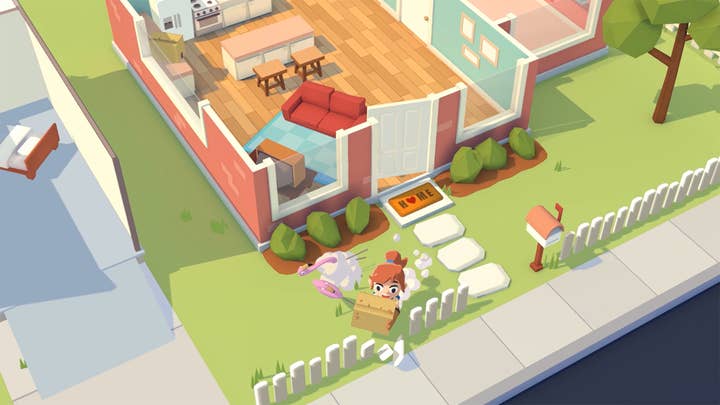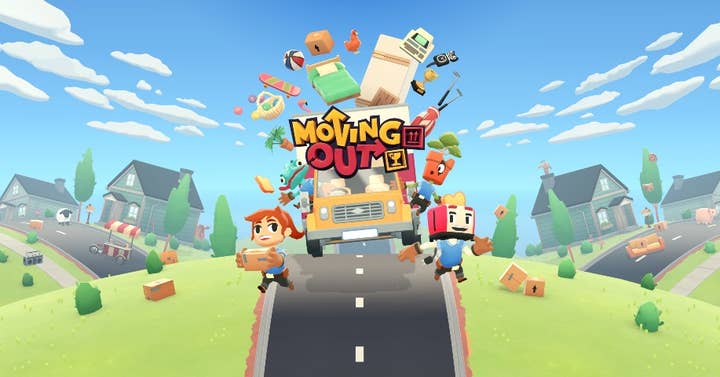Moving Out | Games of the Year 2020
SMG Studio's accessibility efforts benefit more than just disabled players -- they also help sleep-deprived parents and their uncooperative children
Moving Out is not actually my game of the year. My pick for best game of 2020 is Horizon Zero Dawn, which you can hear me wax lyrical about on the podcast or get the abridged version with this unapologetic series of Photo Mode tweets.
But since Horizon Zero Dawn is technically a 2017 title (although it did debut for PC this year, and therefore counts), I took a look at the 2020 games I've played and am instead deferring to the opinion of someone who, frankly, gets a lot more use out of my consoles than I do: my son.
At four years old, my son is already an avid gamer and 2020 is where his enthusiasm for the hobby really took off. We've advanced beyond his two-year-old guffaws every time I crashed on Burnout Paradise Remastered, as well as his adamant three-year-old instructions that I must replay the Crash-Bandicoot-runs-away-from-bear levels on loop and no, Daddy, it doesn't matter that you've already finished those ones and want to move on, I have spoken.
No, now we're in a genuinely more delightful stage: he's able to play himself.
You don't complete stages of Overcooked, you survive them. By comparison, Moving Out is practically zen
Just as his little sister has ruined my YouTube recommendations with her love of Super Simple Songs and those godawful Talking Tom shorts, he has buried my most played games beneath the hours he's racked up on Lego Incredibles, Lego Marvel, Untitled Goose Game, and Ice Age: Scrat's Nutty Adventure (where he is seriously in danger of claiming my first platinum trophy).
Of all the 2020 games he's played, Moving Out -- or Moving House, as it's known in our home -- is the firm favourite.
For those completely unaware, the elevator pitch for Moving Out is "Overcooked, but you're a mover not a chef." Players are presented with an almost-top-down view of a level, and must carry assigned furniture and other hefty objects to the removal van before the time runs out, avoiding the various environmental hazards that lay in your path.
The key difference here is Moving Out is an even more light-hearted experience, and one that can almost be relaxing. Overcooked, as wonderful a game it is, seems to be built around causing as much stress for players as possible: strict time limits, levels that physically block you from accomplishing your task, and convoluted multi-stage recipes that can so easily be burned in the face of the aforementioned challenges -- plus the never-ending, randomly generated string of orders adding even more pressure. You don't complete stages of Overcooked, you survive them.

By comparison, Moving Out is practically zen. Yes, there are time limits but those can be adjusted (more on that later) and any items you place in the van bring you one step closer to completion, the number of objects left to move diminishing each time. The hazards -- certainly in the early game (because my son refuses to let us move on from his favourite levels) -- are almost laughable when stood next to the deathtrap kitchens of Overcooked. Oh no, a slow-moving tortoise is in our way and there's a swimming pool between us and the van. Let's just... go around. Job done.
Not fighting to keep up with the game allows you to just play with it. Remember 'play'? That verb so intrinsic to describing video games but one that can just as easily be supplanted with 'work' in a lot of AAA titles? There may be boxes to haul, but Moving Out knows that may not be top of your priority list -- and it's a mentality I'd love to see more developers embrace and explore further. Heck, even one of the loading screen tips is: "What's the point if you're not having fun?"
Assist Mode could just as easily be called Parent Mode, designed for an uncooperative four-year-old and his sleep-deprived father
So while I may be determined to carry all designated items to the van -- such is the way I have been trained by decades of objective-driven gameplay -- my son has more important things to do. Like smash all the windows, throw all the non-designated items in said pool, chase the chickens, or put that tortoise in the kennel behind the house. And Moving Out allows this.
It does so through Assist Mode, the simple but game-changing settings menu that is core to why I/he have selected this as game of the year.
Not that he's fully conscious of that choice, mind you. I highly doubt his four-year-old mind is able to fathom the disparity between the default design and mechanics of a multiplayer video game and the effects of the modifiers put in place to better serve those of different abilities. (And if it is, I wish he could turn that brilliant mind to mastering the art of eating something other than Heinz tinned beans and sausages).
Accessibility options are, thankfully, becoming more and more common in AAA games -- but they are still limited. It's all well and good allowing me to increase the text size in God of War (which I've only just started. Better late than never, right?), but I'm still squinting at the menus on a 32-inch telly. Similarly, holding rather than tapping buttons is a more convenient way to get through quick-time events, but I still have to know how not to get my arse kicked by a dragon or troll in standard combat.
Moving Out's Assist Mode, however, changes the game in more significant ways.
The most obvious is the generously extended time limits, which are a bloody godsend. Children do not play at the pace developers want them to -- frankly, my son doesn't do anything at the pace anyone wants him to. But with 15 minutes to complete a five-minute level, he can fanny around doing all those superfluous activities he's invented for himself, while I do all the actual work.
Which leads us on to another aspect of Assist Mode: lighter items. When played with the standard settings, some furniture (like sofas and beds) require at least two players to even lift them, but Moving Out enables you to change this so they can be handled by a single player. Yes, it would be easier if he took instruction and actually helped me, but by and large I can just about drag that hefty refrigerator from one end of the level to the other with little to no difficulty.
Even one of the loading screen tips is: "What's the point if you're not having fun?"
That in itself sets it apart from other co-op games. Even in the ever-accessible Lego games, I have to commandeer his controller for two-player interactions where characters have to work together. Games never seem to factor in that not all players have the same ability. You tend to get the two extremes: either both players have a fully-fledged moveset and are required to use it, or one player is severely limited (like collecting star bits in Mario Galaxy). This, on the other hand, is a multiplayer game that is not reliant on multiple players.
There are other aspects of Assist Mode that add to the overall experience: for one, the ability to make items disappear as they enter the van rather than having to cram them all into a limited space -- even more limited by my son dragging whatever he pleases into the same area. Then there's the scalable UI (although it's already very clear to begin with), the ability to skip levels you keep failing (if he lets me, of course), and reduced difficulty (which, on reflection, may explain why the boy and I have encountered so few hazards).
I know it's developed with genuine disabilities in mind, but Assist Mode could just as easily be called Parent Mode, designed for an uncooperative four-year-old and his sleep-deprived father. It enables the adult to crack on while the child farts around to their heart's content.
I would love to see more developers explore ways to level the playing field, to question the often but perhaps inadvertently ableist design decisions in favour of making games more accessible to one and all, regardless of their age or ability.
For that, and the hope it inspires in me going forward, Moving Out is my Game of the Year. (That and Horizon Zero Dawn, of course).










